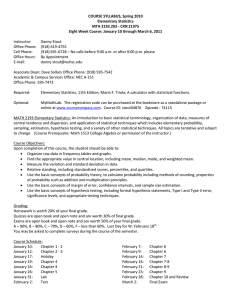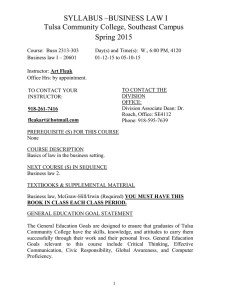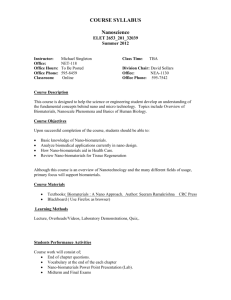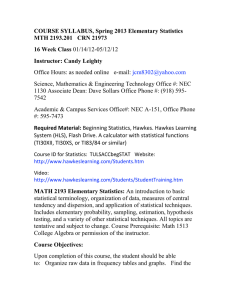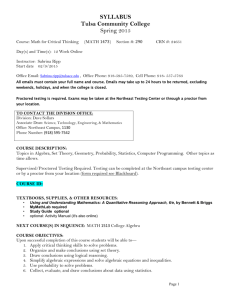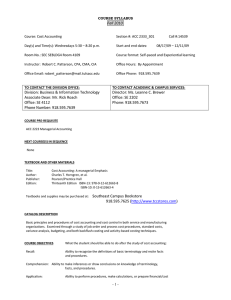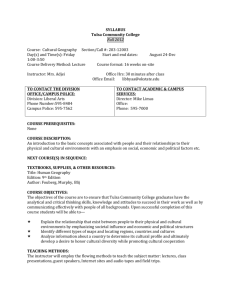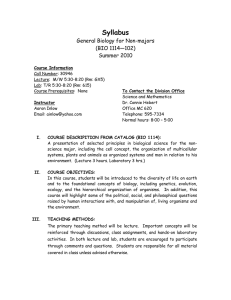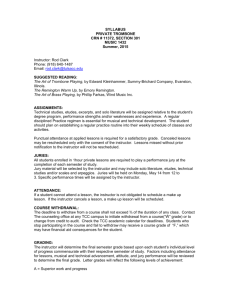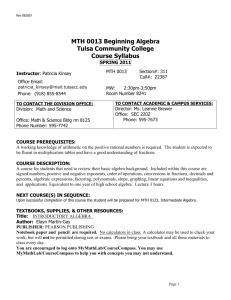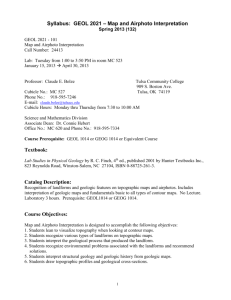Wind Energy Course Outline (8 Week)
advertisement
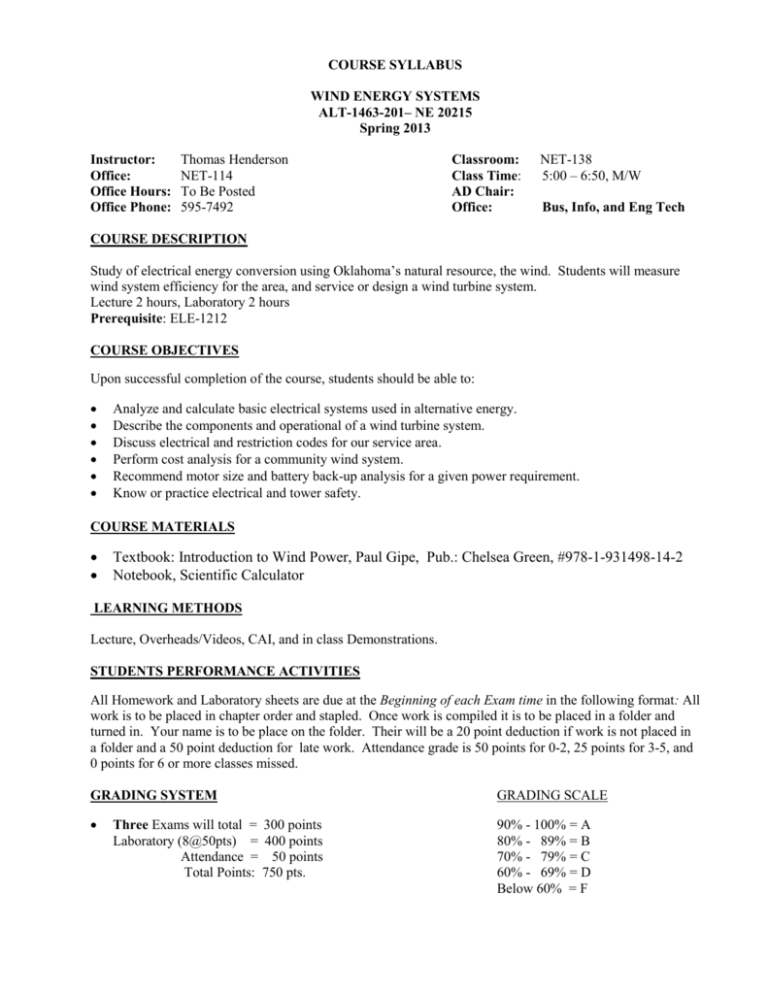
COURSE SYLLABUS WIND ENERGY SYSTEMS ALT-1463-201– NE 20215 Spring 2013 Instructor: Office: Office Hours: Office Phone: Thomas Henderson NET-114 To Be Posted 595-7492 Classroom: Class Time: AD Chair: Office: NET-138 5:00 – 6:50, M/W Bus, Info, and Eng Tech COURSE DESCRIPTION Study of electrical energy conversion using Oklahoma’s natural resource, the wind. Students will measure wind system efficiency for the area, and service or design a wind turbine system. Lecture 2 hours, Laboratory 2 hours Prerequisite: ELE-1212 COURSE OBJECTIVES Upon successful completion of the course, students should be able to: Analyze and calculate basic electrical systems used in alternative energy. Describe the components and operational of a wind turbine system. Discuss electrical and restriction codes for our service area. Perform cost analysis for a community wind system. Recommend motor size and battery back-up analysis for a given power requirement. Know or practice electrical and tower safety. COURSE MATERIALS Textbook: Introduction to Wind Power, Paul Gipe, Pub.: Chelsea Green, #978-1-931498-14-2 Notebook, Scientific Calculator LEARNING METHODS Lecture, Overheads/Videos, CAI, and in class Demonstrations. STUDENTS PERFORMANCE ACTIVITIES All Homework and Laboratory sheets are due at the Beginning of each Exam time in the following format: All work is to be placed in chapter order and stapled. Once work is compiled it is to be placed in a folder and turned in. Your name is to be place on the folder. Their will be a 20 point deduction if work is not placed in a folder and a 50 point deduction for late work. Attendance grade is 50 points for 0-2, 25 points for 3-5, and 0 points for 6 or more classes missed. GRADING SYSTEM GRADING SCALE 90% - 100% = A 80% - 89% = B 70% - 79% = C 60% - 69% = D Below 60% = F Three Exams will total = 300 points Laboratory (8@50pts) = 400 points Attendance = 50 points Total Points: 750 pts. LECTURES: Are the responsibility of the student to record, mechanically. No electronic recording devices are allowed in the classroom during lectures. ATTENDANCE POLICY Class attendance and participation is essential in order to achieve a level of understanding that will contribute to the comprehension of the subject material. For unattended classes, the student is responsible for collecting the material covered from fellow students. The instructor reserves the right to consider participation and attendance in determining the final grades of all cases, which fall within 10 points of any demarcation line. MAKE-UPS All missed exams must be made up 1 week after the missed date. It is the student’s responsibility to schedule the test, which is to be taken outside of regular class time. No make up is allowed for homework. COURSE WITHDRAWAL: The deadline to withdraw from a course shall not exceed 3/4 the duration of any class. Contact the Counseling Office at any TCC campus to initiate withdrawal from a course (“W” grade) or to change from Credit to Audit. Check the TCC Academic Calendar for deadlines. Students who stop participating in the course and fail to withdraw may receive a course grade of “F,” which may have financial aid consequences for the student. COMMUNICATIONS: Email communications: All TCC students receive a designated “MyTCC” email address (ex: jane.doe@mail.tulsacc.edu). All communications to you about TCC and course assignments will be sent to your MyTCC email address; and you must use MyTCC email to send email to, and receive email from, the instructor regarding this course. Inclement Weather: TCC rarely closes. If extreme weather conditions or emergency situations arise, TCC always gives cancellation notices to radio and television stations. This information is also posted on the TCC website (www.tulsacc.edu). GENERAL EDUCATION GOALS: General Education courses at TCC ensure that our graduates gain skills, knowledge, and abilities that comprise a common foundation for their higher education and a backdrop for their work and personal lives. TCC’s General Education goals are: Critical Thinking, Effective Communication, Engaged Learning, and Technological Proficiency. CLASSROOM ETIQUETTE: Open and mutually respectful communication of varied opinions, beliefs, and perspectives during classroom or online discussion encourages the free exchange of ideas that is essential to higher learning and to the ability to learn from each other. Use of any electronic device is at the discretion of the instructor. SYLLABUS CHANGES: Occasionally, changes to the syllabus may be necessary. Students will be notified of any changes to the syllabus in writing. STUDENTS WITH DISABILITIES: TCC provides accommodations for qualifying students in compliance with the Americans with Disabilities Act. For information, students may contact the disabled Student Resource Center, 918-5957115, or the Resource Center for the Deaf and Hard of Hearing, 918-595-7428V, 918-595-7434TTY. ACADEMIC DISHONESTY: Academic dishonesty (cheating) is defined as the deception of others about one’s own work or about the work of another. Academic dishonesty or misconduct is not condoned or tolerated at campuses within the Tulsa Community College system. Tulsa Community College adopts a policy delegating certain forms of authority for disciplinary action to the faculty. Such disciplinary actions delegated to the faculty include, but are not limited to, the dismissal of disrespectful or disorderly students from classes. In the case of academic dishonesty a faculty member may: require the student to redo an assignment or test, or require the student to complete a substitute assignment or test; Record a "zero" for the assignment or test in question; Recommend to the student that the student withdraw from the class, or administratively withdraw the student from the class; Record a grade of "F" for the student at the end of the semester. Faculty may request that disciplinary action be taken against a student at the administrative level by submitting such request to the Dean of Student Services. INSTITUTIONAL STATEMENT: Each student is responsible for being aware of the information contained in the TCC Catalog, TCC Student Handbook, Student Code of Conduct Policy Handbook, and semester information listed in the class schedule. All information may be viewed on the TCC website: www.tulsacc.edu Week #1, 1/14-16: Introduction to Course and Tour Always read ahead of Lectures: Read Chapter 1and 2: Introduction and Application #2, 1/21: No Classes, 1/23 Chapter 3 – Lecture: Measuring the Wind Lab #1a – Collect Data from online Calculator #3, 1/28-30 Chapter 3 – Lecture: Lab #1b – Calibrate and monitor anemometer, also assignment for wind monitoring #4, 2/4-6 Chapter 4 – Lecture: Estimating Output Lab #2a – Power Curves #5, 2/11: Chapter 5 – Lecture: Economics 2/13: Exam #1 ch 1-5, 5:00 pm (Labs 1-2 are due before the start of exam) Assignment: Read ch6. #6, 2/18 2/20 Chapter16 – Lecture: Safety Chapter 6 - Evaluating and Electrical Review #7, 2/25 Chapter 6 – Lecture-Lab Lab #3a – Electrical Calculations Lab #3b – Speed, Power and Number of Blades Lab #3c – Measure Voltage and Power outputs of TCC wind turbines. #8, 3/4 Lecture Notes: Gearboxes and Motors Lab #4a – Measure DC motor/generator Performance Review Lab #4b: Measure Motor Control Circuit Exam #2 Ch 6 and16 + notes #9, 3/11 3/13 Lab #8 – Project Data and Scope SPRING BREAK 18th – 23th #10, 3/25-27 Chapter 7 - Lecture Towers Lab #5a, Tower Calculations #11, 4/1-3 Chapter 8 – Lecture: Cost Lab #5b: Worksheet #12, 4/8-10: Chapter 9 – Lecture: Buying System Lab #6a: Cost Analysis Friday Field Trip to Bergey (Either 4/5 or 4/12) #13, 4/15-17 Lecture: Chapters 10 and 11 Utility and Grid Lab #6b: Grid-tie and Battery Backups #14, 4/22-24 Chapter 13 and 14 Siting and Installation Lab #7: Siting Analysis #15, 4/29- 5/1 Review #16, 5/6 Lab #8 Project Due 5/8: Exam #3, 5:30pm Any of the above information can be changed by the instructor

